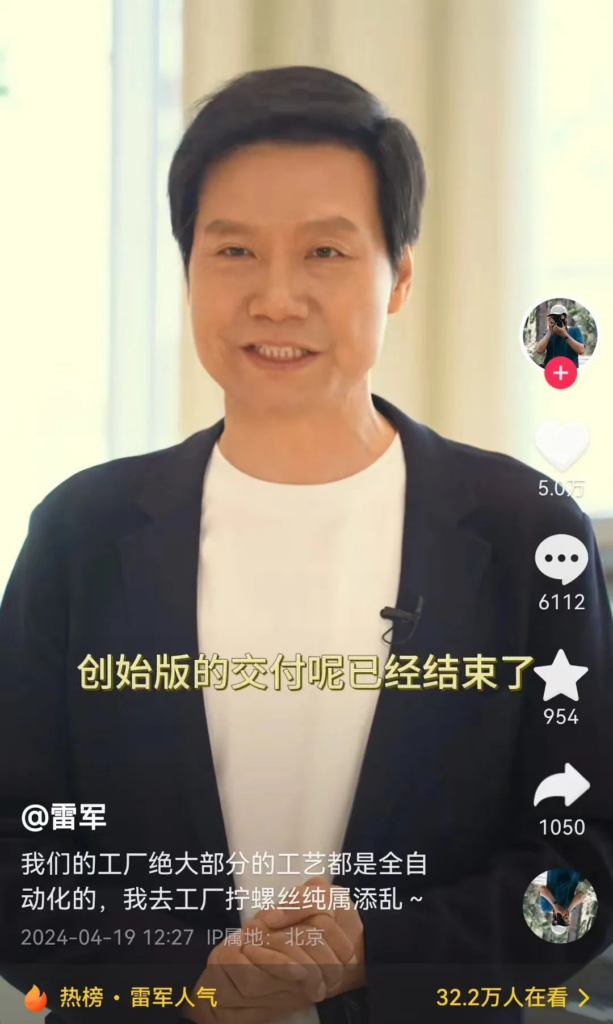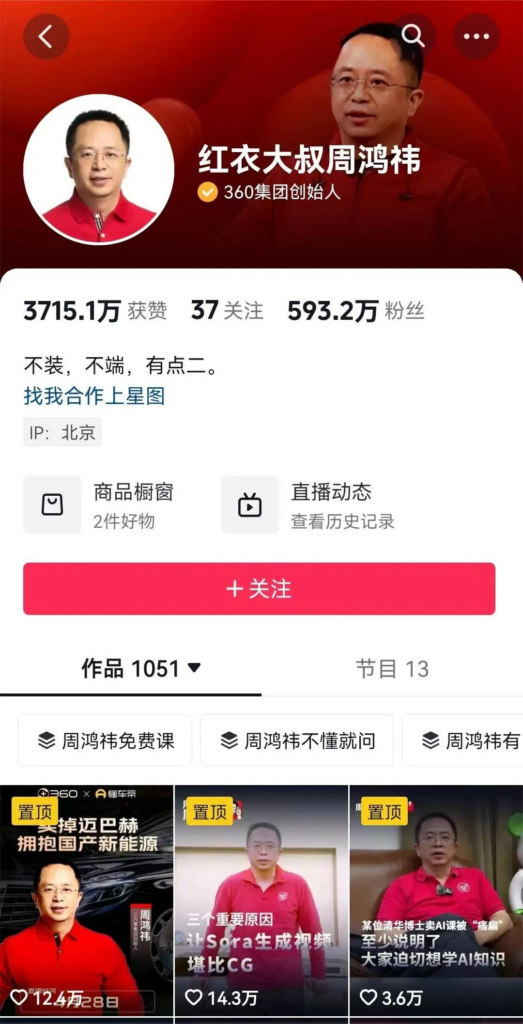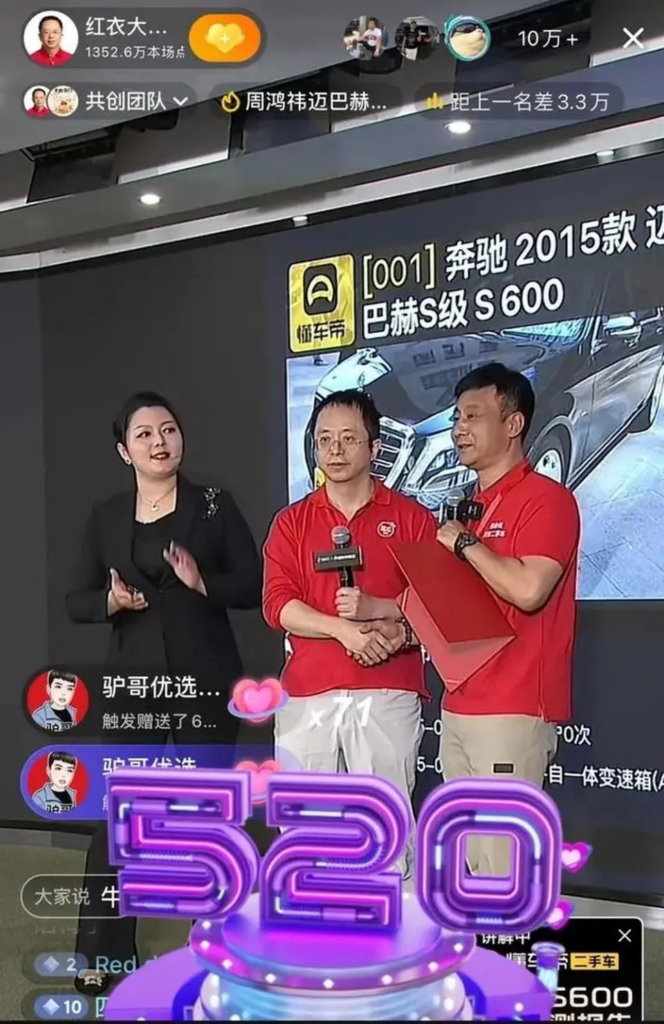If you’re seeking the world’s top entrepreneur in online marketing, look no further than Tesla’s CEO Elon Musk. Musk isn’t just the biggest voice on X, but he also engages with users through livestreaming, such as playing Diablo IV and offering a test drive of the FSD Beta V12.
Chinese entrepreneurs who are influenced by traditional culture, often choose to maintain a low profile and show modesty, seldom appearing in public. However, there’s been a growing trend among entrepreneurs to enter livestreaming rooms. Who will emerge as China’s equivalent of Musk?
Born to be an idol
Some are born leaders, while some CEOs naturally become “influencers” due to their charisma.
Some people are born with leadership qualities and some CEOs are destined to become “influencers” because of their personal charisma.
Over the years, Xiaomi’s CEO Lei Jun’s personal IP has been strongly bound to its brand. In March this year, Xiaomi Auto was officially unveiled, and as of 20 April, Xiaomi’s SU7 lock-in order volume exceeded 70K units. The market responded very enthusiastically and Lei Jun’s publicity was directly linked to this. 2 days earlier on 18 April, Lei Jun conducted a two-hour livestream on Douyin (China’s TikTok equivalent), with a cumulative number of 33.94 million viewers. Lei Jun first talked to several car owners, enquiring about their views on the most appealing aspects of the Xiaomi SU7 to users. Many netizens were interested in topics such as “the reasons for delivery delay” and “if Xiaomi Auto succeeds”, and Lei Jun provided answers to these questions.
Lei Jun’s timing for this livestream was appropriate and his readiness to “respond as necessary” garnered praise from the majority of netizens. Some even elevated Lei Jun to a stature of 1.81 metres, dubbing him a cool and heroic figure. On Weibo, China’s Twitter-like platform, the livestream also generated numerous hashtags. Among these, the topic #Lei Jun doesn’t know if Zhang Songwen bought a car# (雷军不知道张颂文提车了没) gained 170 million views.


Similarly, Zhou Hongyi, the founder of 360 company, who neither drives nor holds a driver’s licence, unexpectedly became the top trending topic on Weibo on the evening of 28 April with the hashtag #Zhou Hongyi’s Maybach sold for 9.9 million RMB (1.37 million USD)# (周鸿祎迈巴赫990万拍出). During the live broadcast, Zhou Hongyi auctioned a Maybach 600 he had owned for 9 years, starting the bid at 600 RMB (83.11 USD), and the car eventually sold for 9.9 million RMB (1.37 million USD). Zhou Hongyi’s willingness to be an online influencer is not a one-time occurrence. Earlier this year, he expressed, “if circumstances allow, I believe entrepreneurs should all become online influencers”.
Learn to speak to the audience
CEOs who sustain long-term popularity are those who embrace a more relatable and personable image.
“How to handle sharp questions from the audience” is a common challenge faced by many CEOs becoming online influencers. This may include former business operation “accidents” and “black spots” which are at risk of being exposed again. During a livestream, NIO CEO Li Bin faced questions like, “Li Auto’s financial results are impressive, what do you think?” and “How are you dealing with the Xiaomi SU7?” Li Bin’s responses, such as “We admire them and learn from their success” and “They’re our friends” showcased his high emotional intelligence, helping him navigate the crisis during the livestream.
However, some CEOs risk losing trust and favour from their audience due to their habit of being a ‘bossy boss’. Nezha Automobile CEO Zhang Yong, shared a post on Weibo after a livestream and said, “my back is bad due to work reasons, so I need to find a comfortable point to lean on”, “let me act, cannot do ah”. He faced many criticisms after this post. A netizen commented, “Usually work life is already bitter enough, no one wants to see ‘dad flavour'(爹味) leadership when surfing the Internet.”
To resonate emotionally with younger audiences, CEOs must continually adjust their approach and stay attuned to current trends. While topics like ‘rebellion’ and ‘struggle’ were popular among young people in the past, the current trend leans towards themes of ‘mutual respect, self-improvement, and reconciliation’. CEOs who sustain long-term popularity are those who embrace a more relatable and personable image. It’s becoming increasingly important for companies to facilitate direct dialogue between CEOs and the public, fostering a sense of sincerity, goodwill, and everyday companionship with the audience.
How to set the right strategy
The team’s planning of engaging topics is crucial.
The reality is, individuals like Lei Jun and Zhou Hongyi, with their exceptional personal brands, are a minority. They possess innate charisma that enables them to captivate audiences effortlessly. Nonetheless, it remains essential for entrepreneurs to cultivate their personal brands. In an era where social media dominates, even a modest degree of personal branding charm can yield significant value, often surpassing returns from equivalent investments in advertising costs.


If an entrepreneur lacks the personal charisma to sustain their personal brand, the team’s ability to plan engaging topics becomes crucial. On 16 April, Liu Qiangdong’s AI digital human made appearances in livestreams. The data indicates that within the first hour, Liu Qiangdong’s AI human gained over 20 million views, resulting in a cumulative turnover exceeding 50 million RMB. During the livestreaming, “Brother Dong” adeptly introduced various products, managed merchandise placement, and interacted with the audience. This campaign turned out to be a good example of utilising technology for enterprise livestreaming.
In summary, while CEOs may initially attract attention through livestreaming with freshness, this may not necessarily translate into a significant market impact. Rather than merely chasing traffic, the focus should be on offering exceptional products that truly resonate with consumers. Converting viewers into customers, from passive observers to active purchasers, poses a new challenge in the era of influential livestreaming.









